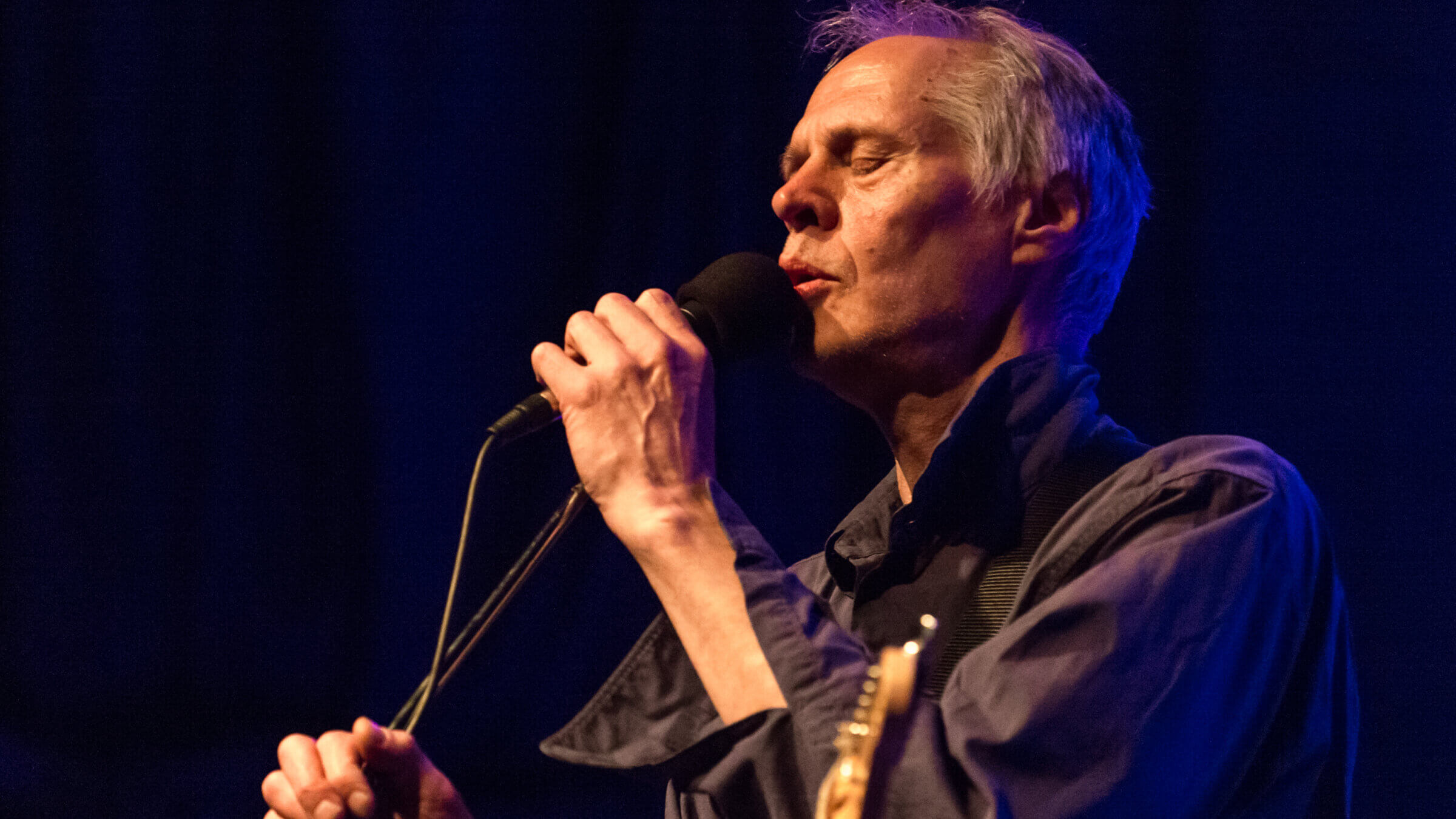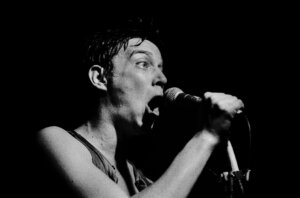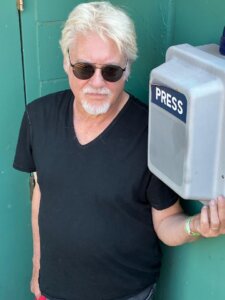Television’s greatest star rarely sought out the spotlight
Tom Verlaine, a guitar anti-hero, leaves behind a legacy of anguish and virtuosity

Tom Verlaine of Television performs in Toronto, 2019. Photo by Getty Images
The New York punk rock and new wave scene of the mid-1970s was not known for its guitar heroics, but Tom Verlaine, who plied that trade with the seminal band Television could have worn that mantle. Not that he’d want the “hero” tag applied, though. Verlaine used the words “small and dry” to describe his band’s sound. He wasn’t a strutter or a talker on stage and his friends say he was pretty reclusive off.
Verlaine, who, according to Vanity Fair, was born into a Jewish family in Morristown, New Jersey, died Jan. 28 at the age of 73. According to his former guitar partner in Television, Richard Lloyd, Verlaine had “been sick for quite a while,” battling prostate cancer, which had metastasized. Television had been asked to open a European tour for Billy Idol, but Verlaine’s doctors told him he was not in good enough health to do so.
From the beginning Verlaine and Lloyd swapped lead and rhythm and brought a sinuous, simpatico guitar style to the stage of CBGB, an expansive sound distinct that of their peers, Ramones, Dead Boys, Talking Heads, The Cramps and Blondie. They fused textural gems with their intertwined leads, solos and rhythm parts, mixing subtle dissonance with haunting, melodic guitar lines.
Before she became a rocker on that scene herself, Patti Smith was a critic and in 1974 wrote in Rock Scene magazine that Verlaine, who favored a Fender Jazzmaster guitar, played “with angular inverted passion like a thousand bluebirds screaming.”
“A real gut punch,” said Steve Wynn, guitarist of the band Dream Syndicate, hearing of Verlaine’s death. “He was so young.” Verlaine “showed me you could be a virtuoso and dangerous at the same time,” Wynn told me. “Such an immeasurable influence on me and, of course, on so many of my fellow guitarist friends.”
The band’s origins
Verlaine, who took his nom-du-rock from the 19th century French Symbolist poet Paul Verlaine, was mostly raised in Delaware. While attending private boarding school, he made friends with Richard Meyers. Both moved to New York City in the late 1960s and Meyers changed his surname to Hell. They formed a trio, the Neon Boys, with drummer Billy Ficca in the early ’70s. In 1973, Lloyd joined and they mutated into Television.
Television put out, arguably, the first “punk’ record, the indie 45 “Little Johnny Jewel,” in 1974. Verlaine and Hell fought over songwriting – Verlaine didn’t want to record any of Hell’s songs – and they acrimoniously split. Bassist Fred Smith took Hell’s spot. In 1977, Television released one of the best albums of the era, Marquee Moon, the long and winding – and stinging — title track becoming their signature song.

That lineup lasted just two albums – Verlaine and Lloyd were often at odds. They broke up for the first time in August 1978. “As soon as Tom had managed to get Hell out of the band, it became solidified,” Lloyd told me back in 1980 before a gig his band was doing at the Rat in Boston. “It became really Tom’s band.” While remaining proud of Television’s music, Lloyd said he was happy to be free of Verlaine’s control and on his own. “I was relieved in no small part by the breakup,” he said. “I was ecstatic.”
From 1979 to 2006, Verlaine made nine solo albums plus a compilation effort in 1996 called The Miller’s Tale: A Tom Verlaine Anthology, a collection of live and studio cuts from both solo and Television days. When he wasn’t playing with Television or under his own name, he’d record with David Bowie and members of Sonic Youth and Wilco, among others. He also played some solo acoustic gigs, including one 1990 show in Boston. A fan shouted out for “Marquee Moon.”
“I was waiting for someone to say that,” Verlaine responded. “Get over it. It doesn’t work.”
Sometimes, Verlaine would join Patti Smith’s group, alongside her guitarist-collaborator Lenny Kaye. “Tom was capable of anything,” Kaye told The New York Times. “He could move from chaotic soundscapes of free jazz to delicate filigree. It wasn’t covered up with distortion. He had a real sense of the instrument and its expressive powers.’
The legacy
He was, Kaye added, “very much not into the persona of being a rock star. His legacy is that he was always looking for a new expression of who he could be.”
Despite their differences, Lloyd rejoined Television for two years in the early ’90s — they recorded an eponymous LP — and then again during the first part of the 21st century. The last time I saw them together was in 2004 at the Paradise Club in Boston; it was their first time in Boston since 1992.
Television has always moved at a more languid pace than its peers; its music is bruised and bleeding with anguish and resignation,” I wrote in the Boston Globe. “Television’s pleasure remains opaque, perhaps more cerebral than visceral. Verlaine, the lead singer, had a nasal, pinched tone and his vocals were often buried in the mix. The pleasure came from the crystalline guitar hooks and knockin’-on-heaven’s door guitar leads. The six new songs, though difficult to fully comprehend on a first listen, did not cause the set to sag. The band played as if for its own satisfaction, not at all for show. But the band’s satisfaction became ours, and we were just happy to be there for the ride.”
The last time I saw Television was May 12, 2014, again at the Paradise in Boston, and the music was – remained – transfixing. Jimmy Rip had replaced Lloyd..
Still, despite their differences over the years, in the end, Lloyd and Verlaine had mended fences. Lloyd recalled their last time together. “We were laughing,” he said.
A message from our Publisher & CEO Rachel Fishman Feddersen

I hope you appreciated this article. Before you go, I’d like to ask you to please support the Forward’s award-winning, nonprofit journalism so that we can be prepared for whatever news 2025 brings.
At a time when other newsrooms are closing or cutting back, the Forward has removed its paywall and invested additional resources to report on the ground from Israel and around the U.S. on the impact of the war, rising antisemitism and polarized discourse.
Readers like you make it all possible. Support our work by becoming a Forward Member and connect with our journalism and your community.
— Rachel Fishman Feddersen, Publisher and CEO






























